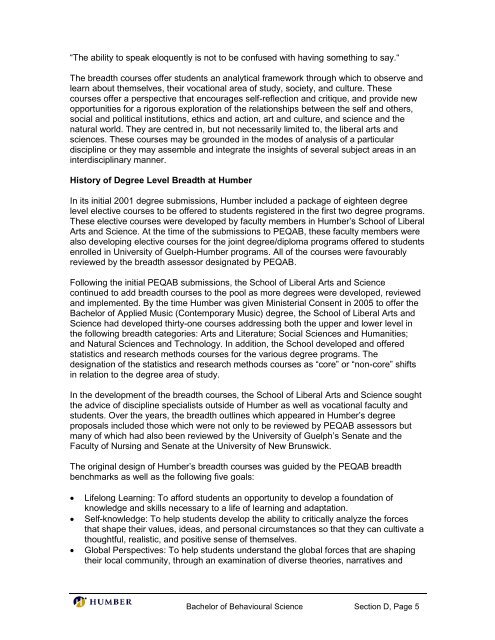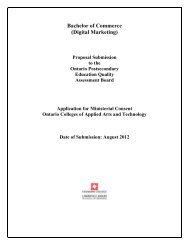Bachelor of Behavioural Science - Postsecondary Education Quality ...
Bachelor of Behavioural Science - Postsecondary Education Quality ...
Bachelor of Behavioural Science - Postsecondary Education Quality ...
You also want an ePaper? Increase the reach of your titles
YUMPU automatically turns print PDFs into web optimized ePapers that Google loves.
―The ability to speak eloquently is not to be confused with having something to say.―<br />
The breadth courses <strong>of</strong>fer students an analytical framework through which to observe and<br />
learn about themselves, their vocational area <strong>of</strong> study, society, and culture. These<br />
courses <strong>of</strong>fer a perspective that encourages self-reflection and critique, and provide new<br />
opportunities for a rigorous exploration <strong>of</strong> the relationships between the self and others,<br />
social and political institutions, ethics and action, art and culture, and science and the<br />
natural world. They are centred in, but not necessarily limited to, the liberal arts and<br />
sciences. These courses may be grounded in the modes <strong>of</strong> analysis <strong>of</strong> a particular<br />
discipline or they may assemble and integrate the insights <strong>of</strong> several subject areas in an<br />
interdisciplinary manner.<br />
History <strong>of</strong> Degree Level Breadth at Humber<br />
In its initial 2001 degree submissions, Humber included a package <strong>of</strong> eighteen degree<br />
level elective courses to be <strong>of</strong>fered to students registered in the first two degree programs.<br />
These elective courses were developed by faculty members in Humber‘s School <strong>of</strong> Liberal<br />
Arts and <strong>Science</strong>. At the time <strong>of</strong> the submissions to PEQAB, these faculty members were<br />
also developing elective courses for the joint degree/diploma programs <strong>of</strong>fered to students<br />
enrolled in University <strong>of</strong> Guelph-Humber programs. All <strong>of</strong> the courses were favourably<br />
reviewed by the breadth assessor designated by PEQAB.<br />
Following the initial PEQAB submissions, the School <strong>of</strong> Liberal Arts and <strong>Science</strong><br />
continued to add breadth courses to the pool as more degrees were developed, reviewed<br />
and implemented. By the time Humber was given Ministerial Consent in 2005 to <strong>of</strong>fer the<br />
<strong>Bachelor</strong> <strong>of</strong> Applied Music (Contemporary Music) degree, the School <strong>of</strong> Liberal Arts and<br />
<strong>Science</strong> had developed thirty-one courses addressing both the upper and lower level in<br />
the following breadth categories: Arts and Literature; Social <strong>Science</strong>s and Humanities;<br />
and Natural <strong>Science</strong>s and Technology. In addition, the School developed and <strong>of</strong>fered<br />
statistics and research methods courses for the various degree programs. The<br />
designation <strong>of</strong> the statistics and research methods courses as ―core‖ or ―non-core‖ shifts<br />
in relation to the degree area <strong>of</strong> study.<br />
In the development <strong>of</strong> the breadth courses, the School <strong>of</strong> Liberal Arts and <strong>Science</strong> sought<br />
the advice <strong>of</strong> discipline specialists outside <strong>of</strong> Humber as well as vocational faculty and<br />
students. Over the years, the breadth outlines which appeared in Humber‘s degree<br />
proposals included those which were not only to be reviewed by PEQAB assessors but<br />
many <strong>of</strong> which had also been reviewed by the University <strong>of</strong> Guelph‘s Senate and the<br />
Faculty <strong>of</strong> Nursing and Senate at the University <strong>of</strong> New Brunswick.<br />
The original design <strong>of</strong> Humber‘s breadth courses was guided by the PEQAB breadth<br />
benchmarks as well as the following five goals:<br />
<br />
<br />
<br />
Lifelong Learning: To afford students an opportunity to develop a foundation <strong>of</strong><br />
knowledge and skills necessary to a life <strong>of</strong> learning and adaptation.<br />
Self-knowledge: To help students develop the ability to critically analyze the forces<br />
that shape their values, ideas, and personal circumstances so that they can cultivate a<br />
thoughtful, realistic, and positive sense <strong>of</strong> themselves.<br />
Global Perspectives: To help students understand the global forces that are shaping<br />
their local community, through an examination <strong>of</strong> diverse theories, narratives and<br />
<strong>Bachelor</strong> <strong>of</strong> <strong>Behavioural</strong> <strong>Science</strong> Section D, Page 5
















